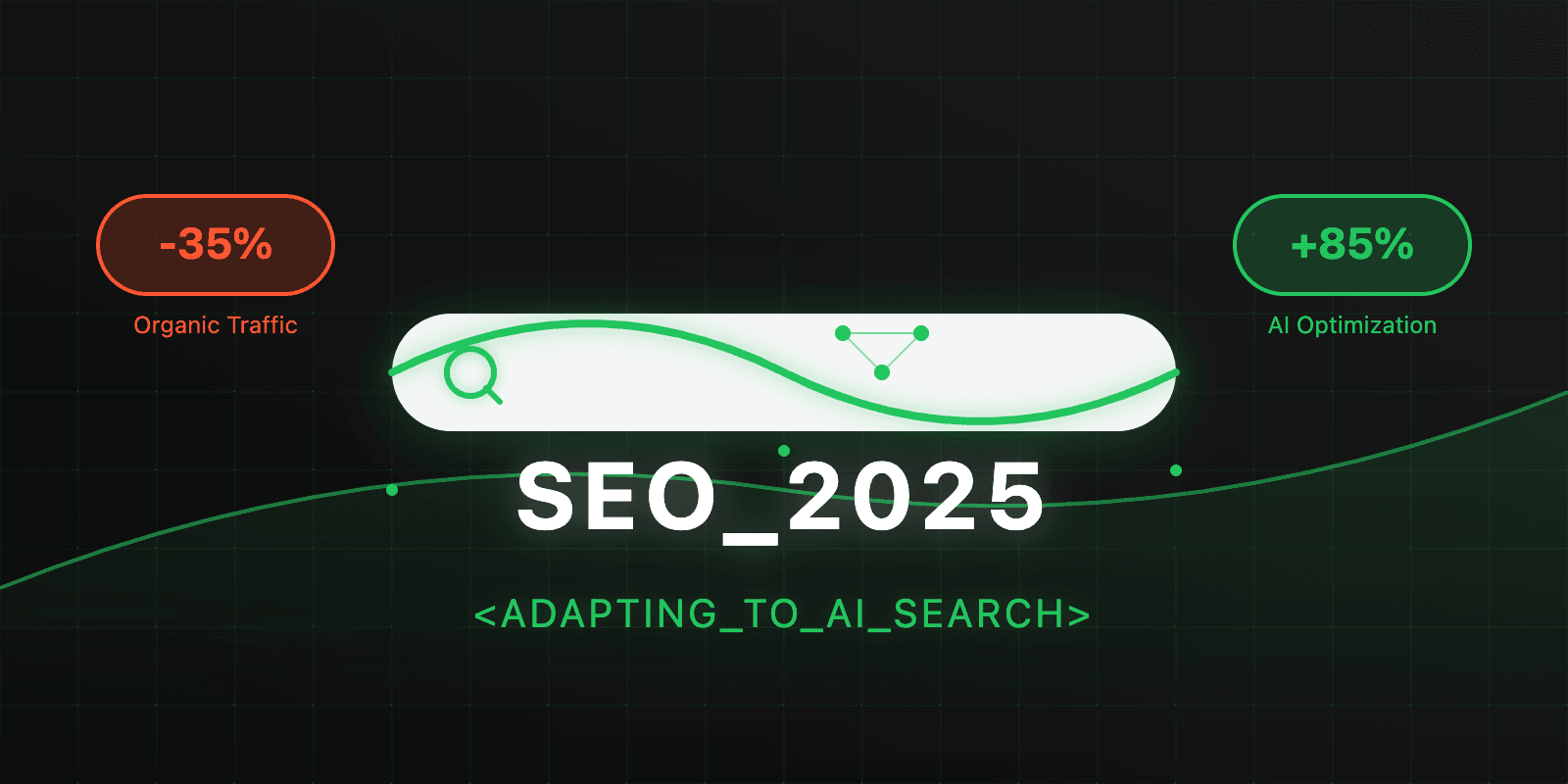Introduction
The Internet is undergoing a profound transformation as we approach 2025, with Google's Search Generative Experience (SGE) and the rise of AI-powered search at the forefront of this revolution. This seismic shift is reshaping the way users interact with search engines and, consequently, how businesses must approach their SEO strategies. According to multiple reports, we're potentially looking at a staggering 35% reduction in organic search traffic. This dramatic change necessitates a fundamental rethinking of SEO practices for businesses aiming to maintain their visibility and organic reach.
The introduction of AI-enhanced search capabilities is not just an incremental update; it represents a complete shift in how information is discovered, presented, and consumed online. This evolution demands that businesses not only adapt their existing strategies but also innovate to create new approaches that align with the capabilities and nuances of AI-driven search algorithms.
The Current State of Search
To fully grasp the magnitude of the changes on the horizon, we have to understand the current state of search and how it differs from the AI results. Traditional search has long relied on a relatively straightforward model: users input keywords, and search engines return a list of relevant web pages via their network of indexed pages. This model has been the foundation of SEO strategies for decades, with businesses optimizing their content to rank higher in these search results pages (SERPs).
However, with the introduction of Google's Search Generative Experience, we're witnessing a fundamental shift in this model. SGE leverages AI to generate summaries and direct answers to user queries, often negating the need for users to click through to multiple websites. This change is not just a feature addition; it's a complete reimagining of the search experience.
Originally, SGE was taken as a joke when Google rolled out their initial model earlier in May of 2024. A lot of answers provided were taken from Reddit forums, resulting in some pretty interesting answer (see below). However, Google has been optimizing their model it's more accurate than ever and no longer suggesting users to add glue to pizza.

It's no longer a laughing matter for SEO marketers and businesses - the impact of this shift on current SEO metrics and traffic patterns cannot be overstated. There's a good possibility that we could see a reduction of up to 35% in organic search traffic as SGE becomes more prevalent. This statistic alone should serve as a wake-up call for businesses that have relied heavily on traditional SEO tactics to drive traffic and conversions.
Understanding the AI Search Revolution
How SGE Changes the Game
The introduction of SGE marks a pivotal moment in the evolution of search technology. At its core, SGE uses sophisticated AI algorithms to generate concise, informative summaries in response to user queries. These summaries often include key information extracted from multiple sources, presented in a cohesive and easily digestible format.
One of the most significant changes brought about by SGE is the reduction in need for users to navigate through multiple search results. Instead of clicking on multiple links to piece together the information they need, users can often find comprehensive answers directly within the search interface. This shift has profound implications for websites that have traditionally relied on organic search traffic.
Additionally, SGE is not limited to just to text-based information. It integrates multimedia elements and interactive features, providing a complete search experience. This integration challenges the conventional wisdom of SEO, which has often focused primarily on text-based content optimization.
The 35% Traffic Reduction: Breaking Down the Numbers
It's important to note that this reduction will not be uniform across all industries or content types. Certain sectors, particularly those dealing with factual information or straightforward queries, may see more significant impacts. For instance, industries like travel, where users often seek quick facts or comparisons, could experience more substantial traffic reductions as SGE provides instant, comprehensive answers.
Current trends suggest that the adoption of SGE and similar AI-enhanced search features will accelerate in the coming years. While the exact timeline for widespread SGE adoption remains uncertain, businesses should anticipate significant changes in search behavior and traffic patterns by 2025.
Strategic Adaptations for Business Owners
1. Content Evolution
In the face of AI-driven search, content strategies must evolve beyond traditional keyword-focused approaches. The emphasis is shifting towards establishing topic authority and providing unique, valuable insights that AI cannot easily replicate or summarize.
To create AI-resistant content, businesses should focus on developing in-depth analyses, original research, and expert opinions that go beyond surface-level information. This approach not only helps in maintaining visibility in AI-enhanced search results but also positions the content as a valuable resource that users will seek out directly.
Multimedia content strategies will become increasingly important. As SGE integrates various content types, businesses should diversify their content portfolio to include videos, infographics, interactive tools, and other engaging formats that complement text-based information.
2. Technical Optimization
While content quality remains paramount, technical optimization will play a crucial role in ensuring that AI systems can effectively understand and utilize your content. Implementing structured data and enhanced schema markup becomes even more critical in this new landscape. These technical elements help AI algorithms interpret your content more accurately, increasing the chances of it being featured in AI-generated summaries.
Optimizing content formatting for AI readability is another key consideration. This involves structuring content in a way that's easily parsed by AI systems, using clear headings, concise paragraphs, and logical flow of information.
Mobile and voice search optimization continue to be important, as these interfaces are likely to become more integrated with AI-enhanced search experiences. Ensuring your content is easily accessible and comprehensible across various devices and input methods will be crucial for maintaining visibility.
3. User Experience Enhancement
In an era where AI can provide quick answers, the user experience on your website becomes a key differentiator. Focus on collecting and leveraging first-party data to create personalized experiences that AI cannot replicate. Develop interactive content that engages users beyond the initial search query, encouraging them to explore your site further.
Loading speed and Core Web Vitals will remain critical factors. As users become accustomed to the instant responses provided by AI-enhanced search, they'll have even less patience for slow-loading or poorly optimized websites. Ensuring your site provides a seamless, fast experience across all devices will be essential for retaining traffic and encouraging engagement.
Do you need a faster website? You're in luck! We might be named after a turtle, but our websites are guarenteed to launch lightning fast! Schedule a call with us today(Opens in new window).
Building AI-Resistant SEO Strategies
1. Diversification of Traffic Sources
With the potential reduction in organic search traffic, diversifying your traffic sources becomes more important than ever. Integrating social media strategies, enhancing email marketing efforts, and building strong communities around your brand can help reduce dependence on search engines.
Developing strategies to increase direct traffic should be a priority. This involves building brand recognition and loyalty so that users seek out your website directly rather than relying on search engines as intermediaries.
2. Content Quality Elevation
Elevating content quality is paramount in the age of AI search. Emphasize expert authorship and adhere to Google's E-E-A-T (Experience, Expertise, Authoritativeness, Trustworthiness) principles. Produce original research and data that provides unique value to your audience. Develop comprehensive case studies and insights that go beyond what AI can easily summarize.
Interactive and engaging content formats will become increasingly valuable. Create content that not only informs but also involves the user, encouraging deeper engagement and repeat visits.
3. Local SEO Enhancement
Local SEO takes on new importance in the AI search era. Develop hyperlocal content that addresses specific community needs and interests. Optimize your Google Business Profile to ensure maximum visibility in local search results. Build local authority through community engagement and partnerships with other local businesses and organizations.
Actionable Steps for Implementation
- Conduct a comprehensive audit of your current SEO performance, identifying areas most at risk from AI-enhanced search.
- Develop a content strategy that focuses on creating unique, in-depth, and engaging content that AI cannot easily replicate.
- Implement technical optimizations, including structured data and enhanced schema markup, to improve AI readability.
- Diversify your traffic sources and build strong direct relationships with your audience.
- Continuously monitor the impact of SGE and other AI search features on your traffic and engagement metrics, adjusting your strategy as needed.
Future-Proofing Your Digital Presence
As we look towards 2025 and beyond, future-proofing your digital presence will require a multifaceted approach. Focus on building strong brand authority that transcends search engine algorithms. Create memorable user experiences that encourage direct engagement with your brand. Invest in innovative content formats that leverage emerging technologies and user interaction patterns.
By adapting to the AI search revolution with strategic foresight and a commitment to quality and user value, businesses can not only survive but thrive in the evolving digital landscape of 2025 and beyond.
